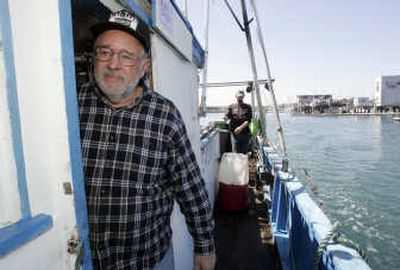Agency declares salmon disaster

Federal authorities declared the West Coast ocean salmon fishery a failure Thursday, opening the way for Congress to appropriate economic disaster assistance for coastal communities in California, Oregon and Washington.
“This is a bleak year,” Jim Balsiger, NOAA Fisheries Service acting assistant administrator, said in announcing the declaration in Portland.
The agency in charge of ocean fishing estimated that the value of this year’s lost catch was $22 million – 90 percent of the five-year average – and projected direct income losses of $60 million to sport and commercial fishing boats, processors, bait shops and other related businesses in the three states.
The governors of Washington, Oregon and California, who requested the declaration, have estimated that rises to $290 million as it ripples through the economy. California is seeking $208 million, Oregon $45 million and Washington $36 million.
“Certainly this has a dramatic effect on all the coastal fishing communities,” said Bob Lohn, Northwest regional administrator of NOAA Fisheries.
This marks the second year in the past three that a federal fishery failure has been declared for West Coast salmon, and last year’s catch was poor, despite liberal fishing seasons. Fishing cutbacks in 2006 due to the collapse of the Klamath River chinook caused a drop in catch value estimated at $16 million. Congress appropriated $60 million in disaster assistance that was distributed last year.
Contacted on his boat off Charleston, Ore., fisherman Jeff Reeves said he was happy to hear of the declaration, because the disaster assistance from the 2006 season closures kept him from bankruptcy.
“Salmon was my moneymaker,” said Reeves, who also serves on the Oregon Salmon Commission. “It just seems to be getting more and more difficult to stay in the fishing business.”
Reeves said crab fishing off southern Oregon has been poor this year and the prospects for albacore are dim. With fuel prices high and most small boats depending on ice for refrigeration, it is difficult to go after albacore because they are often found much farther offshore than salmon or crab.
This year’s declaration stems from the sudden collapse of California’s Sacramento River chinook salmon run, which has been blamed on the deadly gauntlet of irrigation pumps young fish have to swim past in the Sacramento Delta plus starvation conditions once they reach the ocean.
Only 60,000 chinook are expected to return to the Sacramento this fall, about a third of the minimum set by fisheries managers for spawning the next generation. That compares to 775,000 that returned in 2002 when times were flush.
The Sacramento chinook runs are the backbone of commercial fisheries off California and Oregon, where the Pacific Fishery Management Council last month recommended the first-ever total shutdown in ocean salmon fishing. Poor returns up and down the coast left room for only vestigal sport and commercial fishing off Washington this year.
Sen. Gordon Smith, R-Ore., said from Washington, D.C., that he and others from the West Coast delegation hoped to attach a disaster aid measure to the Iraq war supplemental appropriation bill expected to come to the floor in coming weeks, but the amount remains to be worked out.
He added that the White House has opposed attaching extra measures to the Iraq war bill, but he felt confident that something would get through Congress before the end of the session.